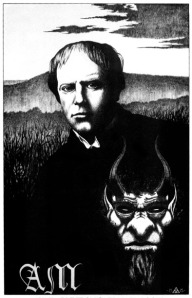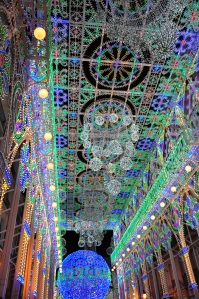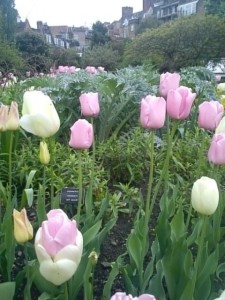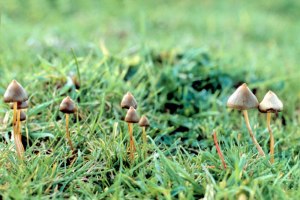“There is no transition as in a small country town, no soft gradations of wider lawns and orchards, with houses becoming less dense, but a dead stop. I believe the people who live there mostly go into the City. I have seen once or twice a laden ‘bus bound thitherwards. But however that may be, I can’t conceive a greater loneliness in a desert at midnight than there is there at mid-day. It is like a city of the dead; the streets are glaring and desolate, and as you pass it suddenly strikes you that this too is part of London.” Arthur Machen, The Inmost Light
I wonder how many people today would recognise this description of Harlesden transformed by Machen’s horror of vacuity, the sense that the deserted high street peters out into a footpath and then perhaps a sheep-track and then nothing. Of course there are fields and public houses but this description is key to the horror of the story: the fear that we live in a pasteboard world, some feeble shops, rows of red and white houses that can be swept away in the wink of an eye. And if houses can be papered over what about their inhabitants? Dr Black’s wife, outwardly beautiful and a devoted companion to her husband, suffers another sort of nothingness, an evil vacuity that lets other things in.
Machen’s stories play with this haunted vacuity, an emptiness that threatens humanity at the most unexpected moments. London is all a swirl with tobacco fumes, incense and unmaking mists, storms that descend suddenly and change known landmarks into unknown streets. Nothing is substantial, even the encrustations of age can be washed clean away while new realities emerge. We are flimsily protected by our potted geraniums and freshly painted picket fences. Normal architectural landmarks take on a symbolic significance.
 The rationalist Salisbury– a familiar Machen creation, the sceptical man about town about to have his beliefs in high streets and picket fences tested by some ambassador from the irrational, shelters under a hidden archway to escape a night-time storm, another unmaking mist. Here he can chew over what he has just heard — the first part of Dr Black’s curious story. It is under the archway (another gateway into extraordinary realms) that he hears raucous voices: ‘Salisbury had some relish for street rows, indeed somewhat of an amateur in the most amusing phases of drunkenness; he therefore composed himself to listen and observe with something of the air of a subscriber to grand opera.’ Modern and appealing, Salisbury a little tipsy from a bottle of Chianti, likes eavesdropping on lovers’ tiffs. Who doesn’t like watching those well-rehearsed gestures, those fixed smiles turning nasty from the top of an omnibus. It might have been us. We have employed the very same clichés ourselves. However, this tiff proves to be a lot more extraordinary and begins the process of unravelling Salisbury’s long cherished beliefs.
The rationalist Salisbury– a familiar Machen creation, the sceptical man about town about to have his beliefs in high streets and picket fences tested by some ambassador from the irrational, shelters under a hidden archway to escape a night-time storm, another unmaking mist. Here he can chew over what he has just heard — the first part of Dr Black’s curious story. It is under the archway (another gateway into extraordinary realms) that he hears raucous voices: ‘Salisbury had some relish for street rows, indeed somewhat of an amateur in the most amusing phases of drunkenness; he therefore composed himself to listen and observe with something of the air of a subscriber to grand opera.’ Modern and appealing, Salisbury a little tipsy from a bottle of Chianti, likes eavesdropping on lovers’ tiffs. Who doesn’t like watching those well-rehearsed gestures, those fixed smiles turning nasty from the top of an omnibus. It might have been us. We have employed the very same clichés ourselves. However, this tiff proves to be a lot more extraordinary and begins the process of unravelling Salisbury’s long cherished beliefs.
 Salisbury becomes caught up in ‘a maze of thought from which there seemed no possibility of escape…’ Slowly he will have to begin unpicking himself, the seams and stitches of his clothing and his respectable, genteel poverty.The story is lit theatrically for effect with an amazing array of street lamps and armchairs upholstered in bright shades of green, even the Benedictine liqueur he drinks is carefully colour coordinated. These are the fairy lights of an unreal city where streets lead to unfamiliar realms. London is depicted as a city of eternal twilight, grey dawns with lamps still aglow are the background for Salisbury’s search for what turns out to be a miraculous light source.
Salisbury becomes caught up in ‘a maze of thought from which there seemed no possibility of escape…’ Slowly he will have to begin unpicking himself, the seams and stitches of his clothing and his respectable, genteel poverty.The story is lit theatrically for effect with an amazing array of street lamps and armchairs upholstered in bright shades of green, even the Benedictine liqueur he drinks is carefully colour coordinated. These are the fairy lights of an unreal city where streets lead to unfamiliar realms. London is depicted as a city of eternal twilight, grey dawns with lamps still aglow are the background for Salisbury’s search for what turns out to be a miraculous light source.
I know that search too, a quest for the silver air of the Sierra Nevada or the deserts of New Mexico. I would describe myself as a tourist of light seeking out the dawn effect of pink sun and grey-white shingle on a mediterranean beach. A light that makes you want to dissolve into it, fizzing into nothingness like an alka seltzer.
Machen’s prose transforms London into an unmapped city where new outlines emerge. I experienced this in my lunch hour on Tuesday after ill advisedly eating some magic mushrooms to escape from that single maze of thought — my obsession with Amanda Wang amplified by the boredom of my job. May I call her Amanda Wang Dang Doodle? I hope that by some weird coincidence she is reading this and remembers the man who recommended Divorce for Dummies and The Story of The Eye. Amanda Wang who put the wang into WANGER, who makes me clutch at my whammy bar and crow like a spur-thighed cockerel.
The unmaking mists descended around the walls of the nearby botanical garden where I unwrapped my sandwich. I was gripped by a series of monster yawns. Through an open window someone was tuning a violin and with that I stepped into Machen’s symbolic world. The trip had started with its usual theatricality. I was becoming attuned to this new universe, nerve endings wound tightly around bone tuning pegs.
 In this new world I could no longer crow, I had no jokes and completely lost my bravado. The carapace dissolves and in its place there is something sad and silvery. Sitting on the bench near the medicinal plants wafted me back to my senses but when I shut my eyes it was all pulsation and chaos. The golden void with its carousel lights and ego death and whooshing phaser pedals. I would never reintegrate into a coherent whole. I no longer wanted to. After all, here I was a quivering proto-blob surrounded by well-heeled matrons ravenously tearing into their baguettes. I didn’t like the look of their sandwich fillings– I didn’t much like the look of mine either, peeping cautiously under a curling slice of bread at some oily flesh and brown lettuce. I didn’t want to be like them, butching around the gardens with big busts and candy floss hair. I wanted Amanda Wang to take me to the hothouse with its tiny waterfalls and sleepy goldfish. I wanted her to murmur among the willows. I wanted not to want.
In this new world I could no longer crow, I had no jokes and completely lost my bravado. The carapace dissolves and in its place there is something sad and silvery. Sitting on the bench near the medicinal plants wafted me back to my senses but when I shut my eyes it was all pulsation and chaos. The golden void with its carousel lights and ego death and whooshing phaser pedals. I would never reintegrate into a coherent whole. I no longer wanted to. After all, here I was a quivering proto-blob surrounded by well-heeled matrons ravenously tearing into their baguettes. I didn’t like the look of their sandwich fillings– I didn’t much like the look of mine either, peeping cautiously under a curling slice of bread at some oily flesh and brown lettuce. I didn’t want to be like them, butching around the gardens with big busts and candy floss hair. I wanted Amanda Wang to take me to the hothouse with its tiny waterfalls and sleepy goldfish. I wanted her to murmur among the willows. I wanted not to want.
I was getting confused and the yawns were becoming more monstrous. Now they involved the whole body. My face was made of clay and breaking up into millions of hostile microbes. I was being unmade, unravelling like a an antique soft toy (I thought of Salisbury)– the eyes unbuttoned from their last wisps of thread, the sawdust pouring out from the hole in my trouser pockets. I wasn’t fit for public duty. And I kept saying, ‘I’m here to help,’ as if I was back in the library.


Lovely flowers beautiful writing